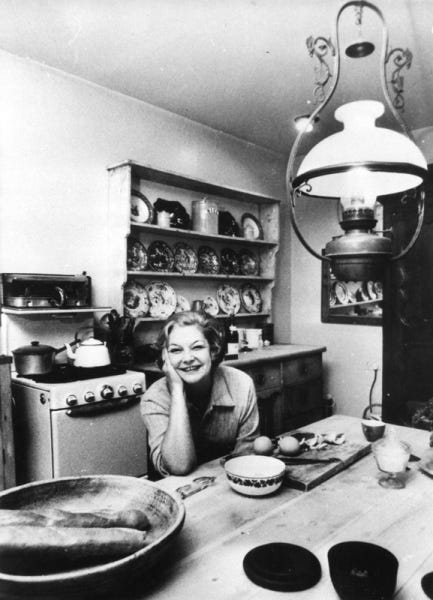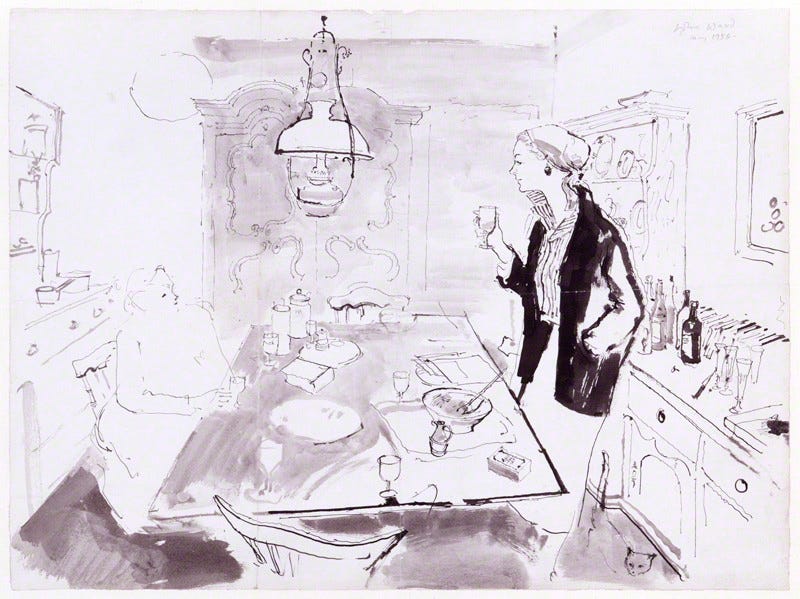I didn’t cook very well last year. It was first noted in early spring when nothing seemed to be happening in the kitchen that promised dinner would occur anytime soon. 6:30 p.m. came and went which prodded the hungry husband to wander about looking for me. He grew increasingly miffed as the months rolled along and he continued to find me still at work or in the garden, or reading, or staring into space. This led to a frenzied search through the freezer and pantry. A lot of microwave defrosting followed, then a haphazard throwing of whatever was discovered into a pot or oven. The reliable result was a middling meal served too close to bedtime to digest. Because my mom raised me to believe that only a lazy or spendthrift woman orders out, the nightly house menu often consisted of plainly sauced pastas, frozen entrees, and throw-everything-in-the-refrigerator-in-the-wok stir fries.
This depressing state of affair continued until I finally turned to Elizabeth David who immediately gave me a good talking to. Opinionated, exact and generous, David has always served as my best kitchen companion. (Clementine Paddleford is my reliable second.)
Considered one of the most influential and exquisite food writers of the 20th century, David built her whole life around the precept that even a novice cook can be skillful enough to create and enjoy fine meals every day. She published her first book, A Book of Mediterranean Food in 1950 when the world, and especially her native England, was still struggling with wartime deprivations. Her evocative writing provided readers with straightforward guidance that could go a long way to assuage their hunger. She introduced simple menus constructed around what might be easy to obtain even with market shortages such as good bread dipped in olive oil, a charcuterie built around cured meat, savory pies. She gave instructions on how to improve tough cuts of meat or ordinary types of fish with fresh herbs and vegetables. Always, she insisted, there must be wine.
Sometimes—not often but sometimes—careful readers stumbled upon slivers of personal adventures embedded in her otherwise straight narrative. David was 16 when her parents shipped her to Paris to study at the Sorbonne. She obtained a lover whose only description was to use “we” when he was around. The war approached and the two (could be the same lover or another, she doesn’t care to reveal) sailed a yacht to Greece, only to be apprehended by Fascists off the coast of Italy where the couple spent several months in jail. Released, they retreated to Capri and were befriended by a famous writer who became her life-long mentor. Ultimately she arrived in Greece. Here, the lover disappeared. But falling in love with the country’s food culture and bounty seemed to amply compensated for his departure. Once more the war interfered and she found safety in Cairo among the British forces.
She could have employed these tales in her books, weaving them in among recipes and instructions. They would have captivate readers as much as the work of her near-contemporary M.F.K. Fisher did. The women shared a sensual delight in food and an equal ability to provocatively portray their experiences learning a new cooking and eating cultures. But David avoided Fisher’s explicitness. The purpose of her stories was not to have her readers long for a life they could not have but to entice them into the adventure of learning the history surrounding a recipe. She goaded her readers to look up what they didn’t know, learn their history, think about them, bring to them their own experiences as they cooked and tasted them, become a part of the conversation surrounding them.

David was almost universally criticized throughout her life for how she wrote recipes. They are often very simple but require several readings to gather the necessary ingredients and then several times more to understand directions of how to use them. She didn’t care at all what others said because this was the way she believed was most beneficial to her readers. It wasn’t to make cooking more difficult. It was to ensure readers learned everything they could about food, about cooking, about the pleasure eating well expanded life.
Many of her critics claimed her resistence to conform to standard cookbook writing was evidence of how difficult she could be. Critics anointed her a most disagreeable woman with a fearful temper mainly. This is true because she did not tolerate bad cooking and fools. But her readers loved her for being herself because it made her books and articles exciting. David didn’t care to be your friend.

M.F.K. Fisher continues to be celebrated, beloved by critics, emulated by food writers, an enticing presence to the reading public. These days, David is barely mentioned even by food writers and mostly unknown to readers. I’ve increasingly realized that Fisher really didn’t teach me much about food or writing. I increasingly turn to Elizabeth David for her deep knowledge and the pleasure of her writing as she generously shares it with me.
With the holidays coming and the certainty of having too many mouths to feed, I finally brought down from the kitchen shelf my extremely worn A Book of Mediterranean Food, French Country Cooking, and Summer Cooking. From my office shelf, I retrieved David’s journalism collections, Is There a Nutmeg in the House and An Omelette and a Glass of Wine. Dinner continues to be late—David is often too good a conversationalist to turn away from and her recipes do take a little concentration. But what does it matter when the results are increasingly so gratifying?
P.S.: I’m about to follow David’s instructions for how to cook an omelet. I tried before and the story remains at the top of home page’s my popular list. It was a miserable failure even though I had turned to Julia Child for help. I’m very interested in finding out what David can do with me. Come back Saturday when I’ll share the results. It’ll be a very short story and hopefully not a disaster.


She's such good company--tart and generous! Back at you, Ruth! have a good weekend.
It breaks my heart more people do her or their shelf!